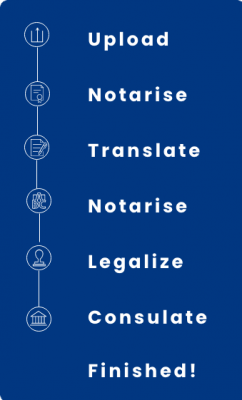FAQ
The legalisation of a French document intended for a foreign authority enables the following information to be certified: the authenticity of the signature; the capacity of the signatory of the document; and, where applicable, the identity of the seal or stamp affixed to the document.
The document must go through the Chamber of Commerce and Industry (CCI), followed by the Ministry of Europe and Foreign Affairs and finally be legalised at a consulate.
The apostille is a simplified legalisation process for countries that have signed the Hague Convention.
This is a stamped Document issued by the Court of Appeals in France.
- Like legalisation, it enables the certification of:
- The authenticity of the signature
- The capacity of the signatory of the document
- Where applicable, the identity of the seal or stamp affixed to the document
The deed must be original and dated within 3 months. It must bear the official seal, the original signature and the name and capacity of the signatory. To be legalised, the document must be written in French or be accompanied by a translation into French. The translation must be carried out by a sworn translator.
Only documents drawn up under private seal require an authenticated signature.
It will be certified either by a notary or by the GEFI system (the CCI).
Yes, a sworn translation of the document into French will be necessary for the MFA to legalise it. This is because the MFA can only legalise documents drawn up in France and in French.







